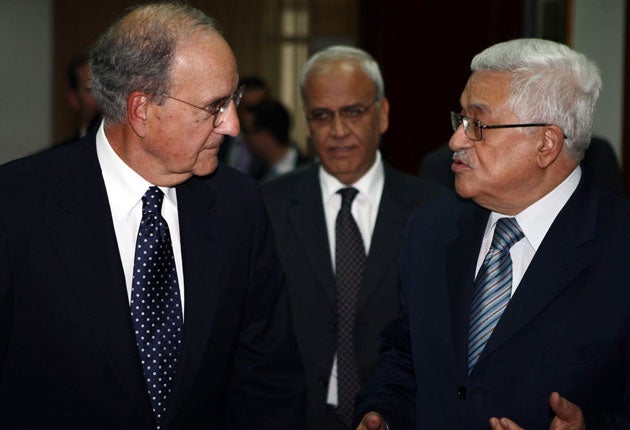World Focus: A tough test for Obama's open-arms diplomacy

Your support helps us to tell the story
From reproductive rights to climate change to Big Tech, The Independent is on the ground when the story is developing. Whether it's investigating the financials of Elon Musk's pro-Trump PAC or producing our latest documentary, 'The A Word', which shines a light on the American women fighting for reproductive rights, we know how important it is to parse out the facts from the messaging.
At such a critical moment in US history, we need reporters on the ground. Your donation allows us to keep sending journalists to speak to both sides of the story.
The Independent is trusted by Americans across the entire political spectrum. And unlike many other quality news outlets, we choose not to lock Americans out of our reporting and analysis with paywalls. We believe quality journalism should be available to everyone, paid for by those who can afford it.
Your support makes all the difference.President Barack Obama begins three days of non-stop conferring with other world leaders tomorrow that will highlight his commitment to multilateralism and US engagement – even with America's natural foes – but threatens also to expose the scant dividends so far yielded by his open-arms approach.
In a week that features both the annual UN General Assembly in New York and a G20 summit in Pittsburgh starting Thursday evening, even a glance at his diary demonstrates how far Mr Obama has distanced himself from his predecessor, George Bush, who gave the UN as little of his attention as possible.
On Tuesday in New York, the president will meet Prime Minister Benjamin Netanyahu of Israel and Mahmoud Abbas, the President of the Palestinian Authority. But there is uncertainty whether this will mark the resumption of substantive talks on Middle East Peace or be little more than a photo opportunity. After shuttling between the parties in the region last week, the special US envoy, George Mitchell, returned to the US apparently with few concrete concessions from either side.
On the same day, Mr Obama will chair a heads-of-government summit on climate change, and on Thursday he will preside over a special session of the UN Security Council to debate nuclear proliferation. It will be only the fifth time in history that the Council has been convened at the heads-of-government level and the first time that an American president will have chaired it. The session was called for by the US.
At the core of his address to the General Assembly itself on Wednesday, meanwhile, will be a call for a new era of co-operation and partnership. It was summed up on the eve of the Assembly by the US Ambassador to the UN, Susan Rice. "Everybody has a responsibility," she said. "The US is leading anew. And we are looking to others to join."
It is partly in this spirit that, last week, Mr Obama scrapped Mr Bush's plans for an anti-missile shield in Europe to protect against a long-range missile attack by Iran. The plan had become a major irritant to Russia, with whom Mr Obama remains anxious to "reset" relations. Washington wants to show that it can listen as well as lead.
In nearly every other regard, meanwhile, Mr Obama will come to the meetings more naked than he would like. The gap between ambitions and reality will be obvious at the climate change talks. He is firmly backing efforts to negotiate a new treaty on emissions limits for signature at another global summit in Copenhagen in December, but the failure of the US Senate to act on necessary legislation means the US may go to it empty handed.
Moreover, there is the heavy cloud of Iran. Mr Obama continues to gamble that he will gain more by remaining open to negotiations with Iran on its nuclear ambitions – indeed a resumption of talks between Iran and six western nations is set for 1 October – even while the signals given by the Iranian leadership remain less than helpful, not least the repetition by President Mahmoud Ahmadinejad on Friday that the Holocaust was "a lie".
The US will be striving this week to corral international support for much harsher economic sanctions against Tehran if it continues to resist UN demands that it cease its enrichment activities. It will be looking first for a more constructive response from Russia which has thus far tried to blunt western opprobrium toward Iran. If Russia still demurs and Iran still obstructs, it is not clear what Mr Obama will do.
And in Pittsburgh, where the focus of the G20 talks will be the still-fragile state of the world economy, Mr Obama will face criticism that his words have not been matched by action, particularly regarding the imposition of tougher regulation on the banking industry.
He hinted at an awareness of this during his weekly radio address this weekend. "We know we still have a lot to do ... to strengthen the rules governing financial markets," he said.
Barack Obama: A week of summits
Tomorrow
Trilateral meeting in New York between Mr Obama, the Israeli Prime Minister Benjamin Netanyahu and the President of the Palestinian Authority Mahmoud Abbas.
Annual United Nations General Assembly in New York – Mr Obama chairs a heads of government summit on climate change.
Wednesday
Mr Obama addresses UN General Assembly.
Thursday
Special session of UN Security Council on nuclear proliferation – Mr Obama will be the first American president to chair such a session.
Evening: Group of 20 summit in Pittsburgh
Join our commenting forum
Join thought-provoking conversations, follow other Independent readers and see their replies
Comments